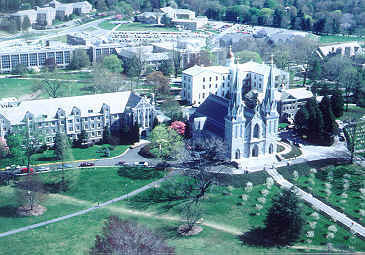Introduction
Villanova University’s beautiful 254-acre campus is located twelve miles west of Philadelphia, in the famed “Main Line” suburban area. VU is the oldest and largest Catholic university in Pennsylvania, and was founded in 1842 by the Order of Saint Augustine. Saint Augustine believed in a commitment to community, and to the connections between the mind and the heart, and between truth and love. The Augustinian values stated on our university seal— Veritas, Unitas, Caritas—(translated as truth, unity, and love) still guide “’Nova Nation” today. Villanova is home to students of all faiths, and tends to attract students who are dedicated to social responsibility, volunteer work, and contributing to the greater good.
The most distinctive aspect of this school is its sense of community, since this is the aspect of the university that permeates all others and in many ways defines what it means to be a Villanovan. The care that people show for one another, both on our campus and across the world, is tangible and on display constantly. This community focus is central to everything—from coursework to social events to volunteer opportunities. It even flows through our 90,000-strong alumni community. As a recent alumna, I’ve already gone back to VU for several events and I would like to maintain a strong connection to the university for many years to come. During my four years there, I was helped by countless alumni in all different facets of life and I would like nothing more than to give back as much as I have received.
VU’s scenic campus, a designated arboretum, has more than sixty buildings— including twenty-six residence halls and a library with more than 800,000 volumes. In addition to offering more than forty rigorous academic programs, this institution provides students with a wide range of opportunities to study abroad and to participate in more than 130 campus organizations. Student services are excellent—from the VU Laptop program to the Student Health Center to the dining halls and “Holy Grounds” coffee shops to Career Services.
Extracurricular opportunities definitely appeal to a broad range of student interests. Throughout my four years as an undergraduate, I served as a VU School of Business peer advisor, an ambassador, a liturgical minister, and president of the National Society of Leadership and Success. I was also involved in intramural sports, including basketball, soccer, and club Frisbee. I led a group of 12 students on a service trip to San Jose, Costa Rica, during my senior year, and spent a summer studying and working abroad in London.
VU is also home to the new Davis Center for Athletics, along with many intramural and varsity sports teams, including the nationally recognized Wildcat’s men’s basketball team, which generates a lot of excitement and community spirit on campus. This university is one of only five schools to have advanced to the NCAA Tournament “Sweet 16” in three of the last four seasons.
Villanova University. Whenever the topic of my alma mater is raised, I could speak about the rigorous academic experience, the challenging coursework, and the world-class professors who encourage students to expand their horizons every day. I could speak about the incredible opportunities outside of the classroom, with the hundreds of student organizations that exist on campus. I could talk about the wonderful opportunities afforded to students through our internship, community service, and international studies programs. But the most distinctive aspect of VU is its sense of community, and the genuine care that people show for one another. My experience can be summed up in four words, taken from a speech the university President Father Peter Donohue gave to a group of students during my senior year: ‘Take Villanova with you.’ Father Donohue was speaking about the challenges facing us as we prepared for the next stage of our lives. He encouraged us to reflect upon our time at VU—upon the many experiences that shaped us, helped us mature, and forced us to go beyond our comfort zones. He then challenged us to take VU with us. This school provided me with the opportunity to do just that, through an education, experience, and community of mentors and friends who will shape the rest of my life.
